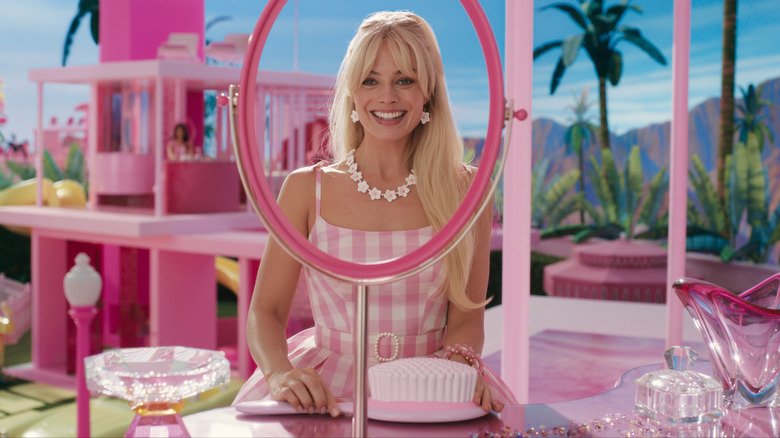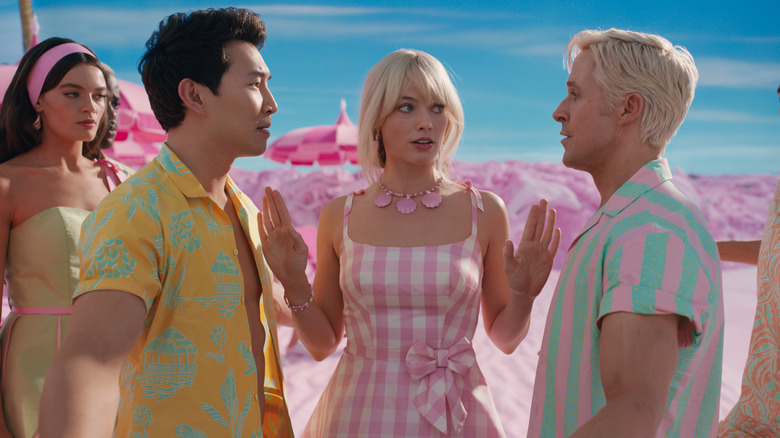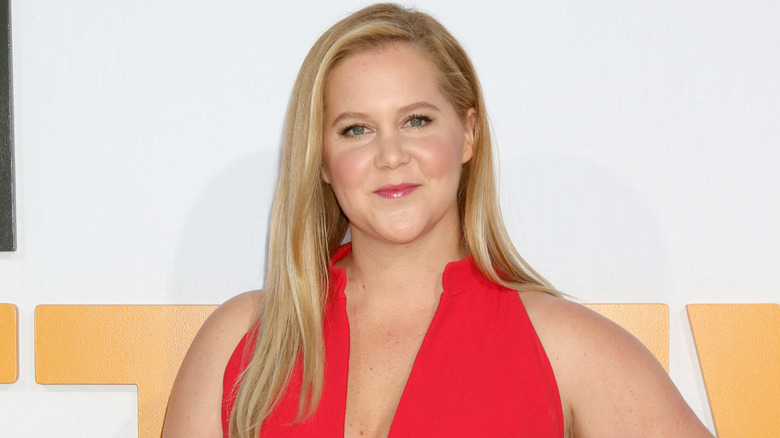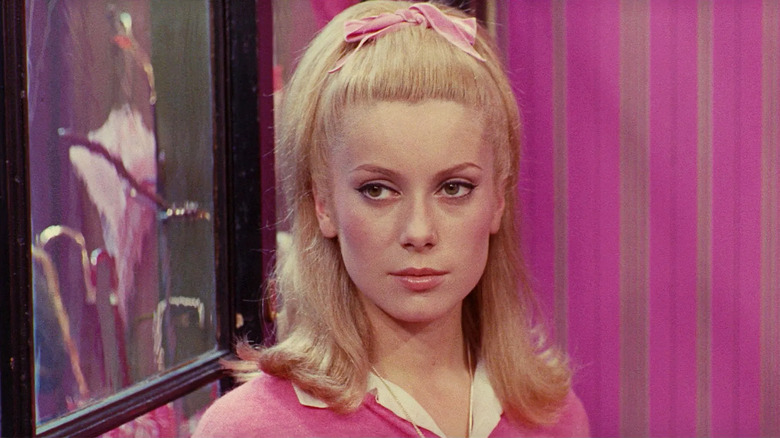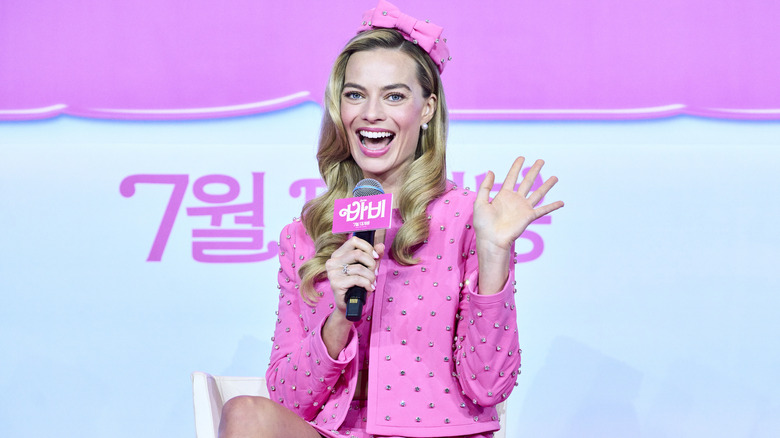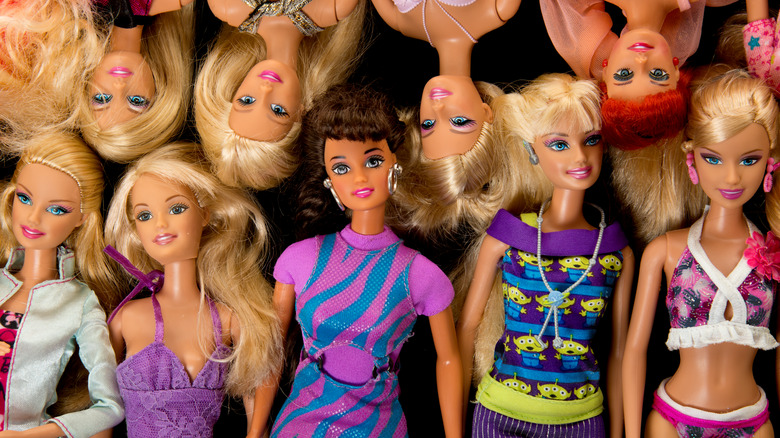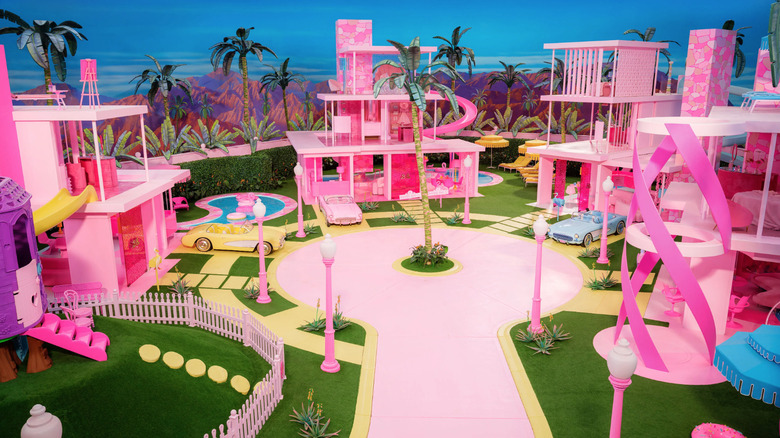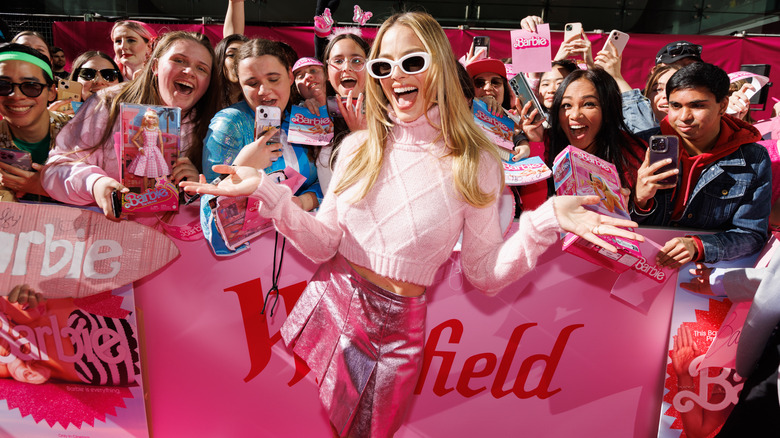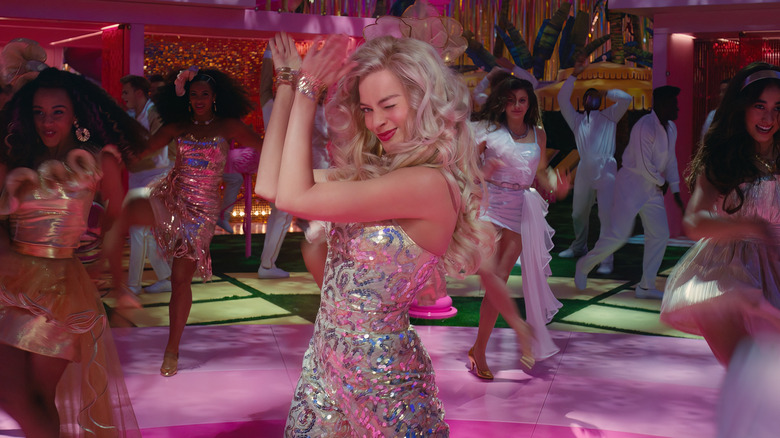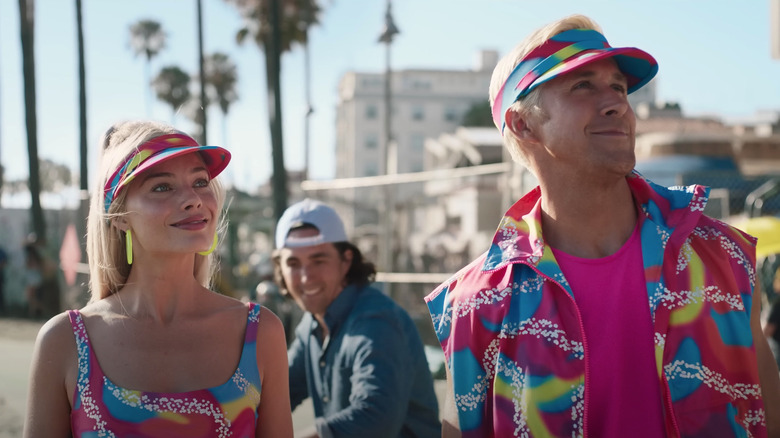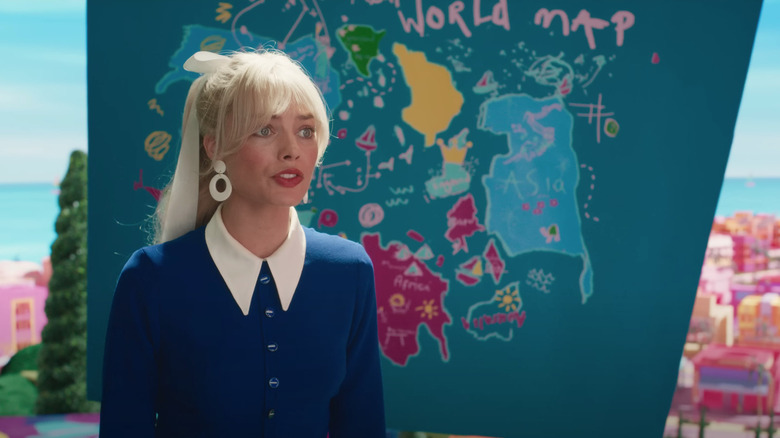The Untold Truth Of The Barbie Movie
Life in plastic has never been more fantastic than in Greta Gerwig's highly-anticipated live-action "Barbie" movie. The first of its kind after more than 40 nostalgia-evoking animated films starring the iconic doll, "Barbie" takes viewers on a fish-out-of-water adventure unlike any before as Barbie (Margot Robbie) and Ken (Ryan Gosling) experience the real world for the first time. With Gerwig helming the project alongside her partner and co-writer Noah Baumbach, as well as the multitalented Robbie under her production company LuckyChap Entertainment, audiences expect nothing less than a heartwarming, introspective, feminist-driven exploration of gender relations and the human condition. No pressure.
The real pressure comes from living up to Mattel's more than 60-year legacy as the fashion doll's creator and manufacturer. Nevertheless, Gerwig and her team have had no trouble building hype for the movie so far. Between the film's inventive marketing strategy and eye-catching trailer, "Barbie" has quickly become the movie of the summer — if not the year. If you're looking to immerse yourself even further in the colorfully-saturated world of Barbie, you've come to the right place. Let's unbox some Barbielicious facts you may not know about the "Barbie" movie.
14 years in the making
It's taken 14 years of studio changes, rewrites, and recastings to get Barbie to the big screen, beginning all the way back in 2009 when Mattel first teamed up with Universal Pictures and producer Laurence Mark. The project never got very far because, in 2014, Sony acquired the rights and hired Jenny Bicks to pen the screenplay. Production was expected to begin by the end of the year, but by 2015, multiple rewrites were still being made by the likes of Diablo Cody, Lindsey Beer, Bert V. Royal, and Hillary Winston. Cody reflects on why she was never able to nail down a solid draft. "When I was first hired for this, I don't think the culture had not embraced the femme or the bimbo as valid feminist archetypes yet," she told GQ. "I didn't really have the freedom then to write something that was faithful to the iconography; they wanted a girl-boss feminist twist on Barbie, and I couldn't figure it out because that's not what Barbie is."
Actors Amy Schumer and Anne Hathaway were tied to the project at separate points. But by the time Sony's rights to the project expired in 2018, the project experienced another creative overhaul when moving to Warner Bros. Pictures. That's when Robbie entered the picture to produce under LuckyChap and got Gerwig and Baumbach on board to write a script. "Whatever you're thinking, we're going to give you something totally different — the thing you didn't know you wanted," Robbie told The Hollywood Reporter when discussing her producing strategy.
The Barbie that never came to fruition
It's difficult to picture anyone else but Margot Robbie playing the titular character in "Barbie," but years before she was ever considered, Amy Schumer was once the one who held the Barbie title. Known for her provocative and irreverent stand-up comedy, Schumer's "Barbie" would've inevitably looked a little different from the "Barbie" we know today. The story was poised to take a more unconventional route to the fish-out-of-water concept being used in 2023's version of "Barbie." "That idea of an anti-Barbie made a lot of sense given the feminist rhetoric of ten years ago," Cody told GQ. During this time in 2015, Barbie was still detested as a bimbo blonde with unrealistic body proportions. This was before Mattel's 2016 Barbie revamp, which included various new body types for the doll. Schumer's embodiment would've likely provided some satirical commentary on the contradictions of Barbie.
In 2017, Schumer left the project, citing scheduling conflicts. "The film has so much promise, and Sony and Mattel have been great partners. I'm bummed, but look forward to seeing Barbie on the big screen," she told Variety at the time. More recently, she's admitted it was due to creative differences. During an interview on "Watch What Happens Live," Schumer confessed that her story's version of "Barbie" didn't feel "feminist and cool." As for what she thinks about Gerwig's rendition, "I can't wait to see the movie," she says. "It looks awesome."
Pulling inspiration from classic Technicolor musicals and psychotherapy literature
Gerwig and Baumbach's writing process looked slightly different from what you'd usually expect for a film of this scope. Not only did they have complete creative freedom, but it was also written during the COVID-19 lockdown. It began with a treatment in the form of an abstract poem that's been described as similar to the Apostles' Creed. From there, "It was literally imaginative play," Gerwig told Vogue.
At the same time, the duo was writing the film adaptation of Don DeLillo's 1985 novel "White Noise." "They're kind of connected in a funny [way]. The execution is different but there are aspects of the world of 'White Noise' that actually informed some of how we looked at 'Barbie.'" Baumbach told Entertainment Weekly.
During the Vogue interview, Gerwig recalls pulling inspiration for "Barbie's" story arc from "Reviving Ophelia," the 1994 psychotherapy book about the challenges faced by American adolescent girls. "How is this journey the same thing that a teenage girl feels? All of a sudden, she thinks, 'Oh, I'm not good enough,'" Gerwig said, explaining her approach. As for the look of "Barbie," Gerwig looked to Technicolor musicals like "The Red Shoes" and "The Umbrellas of Cherbourg." "They have such a high level of what we came to call authentic artificiality," Gerwig explained. Back in 2022, Robbie's alleged Letterboxd account was unsurfaced with a public list of movies under the title "Watch for Barbie." The list included films such as "The Umbrellas of Cherbourg," "The Truman Show," and "The Young Girls of Rochefort."
Margot Robbie thought Barbie would never be made
No one from Warner Bros., Mattel, or LuckyChap saw Gerwig and Baumbach's script until it was complete. After reading it for the first time, Robbie recalls to Vogue about how she turned to her partner Tom Ackerley and said: "This is so genius. It is such a shame that we're never going to be able to make this movie." It was a too-good-to-be-true moment. "I think it's that Greta kind of pushes it in directions that I didn't think they would let us go in," Robbie explained during a Fandango interview.
"I think a big part of that was kind of acknowledging the things that people find problematic about Barbie as well as the things people love about Barbie." The star went on to express how she was worried about the reaction to framing Mattel and their CEO as the villain. Luckily, it all worked out in the end without having to sacrifice Gerwig and Baumbach's vision.
Kickstarting Mattel's Toy-Verse
Out with the superheroes and in with the toys — Mattel is taking a page out of the superhero franchise book. With the worsening franchise fatigue among moviegoers, this could be a crucial moment for the toy company's film division, Mattel Films, to swoop in and shake things up. "In the world we're living in, I.P. is king. Pre-awareness is so important," Executive Producer of Mattel Films Robbie Brenner tells The New Yorker. Mattel CEO Ynon Kreiz has every intention of expanding the Barbie universe, but he won't stop there. As of right now, Mattel Films has 45 movies in development based on the toy brand's extensive list of IPs. Some of these live-action projects include a Polly Pocket film helmed by Lena Dunham and starring Lily Collins, an "A24-type, surrealistic" Barney film with Daniel Kaluuya, and a "gritty" Hot Wheels film produced by J.J. Abrams' Bad Robot.
Although these films may target a more adult audience, Brenner reassures The New Yorker, saying, "We're not going to make any rated-R movies. We're not going to make anything that feels violent, or that is alienating to families ... We want to stay within the parameters of what Mattel is." The company also claims it isn't in the film business to boost toy sales. Out of both promises, one is a little harder to believe, but as long as the movies are good, we won't hold it against them.
Building Barbie Land
Crafting "Barbie's" life-size Dreamhouse at the Warner Bros. Studios lot outside of London was no easy task for production designer Sarah Greenwood and set decorator Katie Spencer. Not only did they create the iconic three-story wall-less pink mansion (slide and all), but they also built an entire Barbie world around it known as Barbie Land. When talking to Architectural Digest (AD), the two referenced Palm Springs midcentury modernism as inspiration. "Everything about that era was spot-on," says Greenwood.
To create the real Barbie feel of "authentic artificiality," Gerwig and her team designed the house with a mix of 3D items and 2D decals to replicate the real-life toy's details. And although the sets are life-size, they're still 23 percent smaller than human size, because anyone who plays with Barbies knows the proportions are slightly off when Barbie enters her Dreamhouse. "Maintaining the 'kid-ness' was paramount," Gerwig told AD. "I wanted the pinks to be very bright, and everything to be almost too much."
Going all out on the pink meant running the risk of a global pink paint shortage ... which actually ended up happening. "They used as much paint as we had," Lauren Proud — vice president of global marketing at Rosco — told The Los Angeles Times. But according to Proud, the "Barbie" production wasn't solely to blame. With COVID-19 supply chain shortages and Texas' 2021 deep freeze, the company was already at a disadvantage.
Barbiecore frenzy
Look no further than the fashion icon for your style inspiration. For decades, Barbie has been dressing head-to-toe in the latest fashion trends, and if she can incorporate her signature pink into the look, you can guarantee she will. Some of Barbie's most memorable looks include 1971's Malibu Barbie, 1993's Western Stampin' Barbie, and 1994's Hot Skatin' Barbie. Today, they're being reimagined by costume designer Jacqueline Durran for the big screen. "Barbie really is interlinked with fashion, because how you play with her is by dressing her," she tells Vogue. "Clothes are her form of expression."
When hype around the "Barbie" movie started building online, Barbie's looks were adopted by the masses in an aesthetic known as Barbiecore. Not only have people on TikTok and Instagram been sporting the highly-accessorized, ultra-feminine hot pink outfits, but celebrities have also hopped on the trend. Fashion influencer Emma Chamberlain wore hot pink Valentino on the cover of Vogue Australia last September, while "Euphoria" star Zendaya dressed in a hot pink trouser suit at the Valentino Paris Fashion Week last year. Although the trend has come in and out of style since its emergence in the early 2000s, you can expect to see the craze continue to grow in popularity leading up to the theatrical release of "Barbie."
Disco isn't dead
When Dua Lipa's disco-pop anthem "Dance the Night Away" debuted as "Barbie's" lead single, the song became an irresistible earworm for the next few weeks. In the trailer, the Barbies and Kens hit the dance floor with a perfectly choreographed dance to Lipa's song, but Barbie's out-of-pocket existential question threatens to ruin the vibes. "Do you guys ever think about dying?" she asks, indicating the beginning of something being off about the doll.
Lipa is far from the only A-list artist to be featured on the film's iconic soundtrack produced by Oscar and Grammy Award-winning Mark Ronson, with names like Lizzo, Billie Eilish, Charli XCX, Nicki Minaj, Ice Spice, and others contributing their musical talents. The star-studded album is all anyone will be singing this summer, but it's far more than just a marketing tactic. Robbie explains to Rolling Stone how integral the music is to the film, saying, "You're hearing lyrics that are responding to what's happening onscreen, so the music became more than just music — it became a device to enhance what the audience was watching and experiencing, and got to be the voice of the audience."
While Technicolor musicals inspired the look of "Barbie," disco has greatly influenced "Barbie's" sound. "Disco comes with the assumption that people want to dance and have a good time. It didn't realize it stopped being cool in the Seventies. Disco had no idea people started listening to punk rock. Disco is still there, in bell-bottoms, doing its thing," Gerwig explains. Ronson and his collaborator Andrew Wyatt also composed the film's original score.
When life imitates art
When Barbie and Ken find themselves in the real world, something strange happens. Once confident and self-assured without any worries in Barbie Land, Barbie is now exposed to a world that objectifies her, causing feelings of insecurity and embarrassment. Meanwhile, Ken, who is used to only existing in the context of Barbie's sidekick, is being treated like ... well, a man. While rollerblading in matching vibrant '80s workout gear, Barbie becomes increasingly uncomfortable, "What's going on? Why are all these men looking at me?" she asks. "Yeah, they're also staring at me," Ken replies excitedly.
While filming the scene at California's Venice Boardwalk, life imitated art when spectators left Robbie feeling self-conscious. "People would go by Ryan, high-five him, and say, 'Awesome, Ryan, you look great!' And they wouldn't actually say anything to Margot," Gerwig told Rolling Stone. "They'd just look at her. It was just surreal. In that moment, she did feel self-conscious. And as the director, I wanted to protect her. But I also knew that the scene we were shooting had to be the scene where she felt exposed. And she was exposed, both as a celebrity and as a lady."
Banned in Vietnam
Unfortunately, Vietnamese Barbie fans won't get to see "Barbie" on the big screen, due to a ban issued by Vietnam over a scene showing a map with the "nine-dash line." The dashes on the map represent China's assertion that they own the South China Sea and the islands that inhabit it. However, Vietnam and other countries, including the United States reject this claim, considering it unlawful. The map can be seen in the trailer during the scene where Barbie visits Kate McKinnon's Weird Barbie. Behind Barbie is a hand-drawn, extremely inaccurate map depicting the dashes.
Warner Bros. responded with a statement that reads, "The map in Barbie Land is a child-like crayon drawing. The doodles depict Barbie's make-believe journey from Barbie Land to the 'real world.' It was not intended to make any type of statement." The Phillippines have also threatened to ban the film in tandem with Vietnam.
Meanwhile, in France, "Barbie" made international news for a very different reason. People were quick to point out the French promotional poster's racy tagline, which reads, "Elle peut tout faire. Lui, c'est juste Ken" or in English, "She can do everything. He's just Ken." But in French slang, Ken is also the word for f***. Suddenly the tagline takes on a whole new meaning: "She knows how to do everything. He just knows how to f***." There's been heavy debate online on whether the wording was deliberate or not, but we like to believe it's another carefully crafted viral moment.
Acknowledging Barbie's controversial history
For all the love Barbie receives, there is an equal amount of criticism directed at the doll. Barbie's long controversial history has become a significant part of the brand's identity, with scandals dating back all the way to her creation. The most frequent criticisms Barbie encounters are for her unrealistic beauty standards and lack of diversity. Some major offenses that still follow Barbie today include 1992's Teen Talk Barbie with bimbofied catchphrases like "Math class is tough," the 1975 Growing Up Skipper with pubescent growing breasts, and the 1963 diet book accessory titled "Don't Eat." When Bratz fashion dolls came around in the early 2000s, there was a major shift in the toy landscape. Barbie quickly became the less desirable toy, ceding ground in the doll market to her pouty-lipped, trendy competitors.
Once Robbie and Gerwig got involved with "Barbie," they knew the inevitable had to be addressed. "We of course would want to honor the 60-year legacy that this brand has," Robbie told Vogue. "But we have to acknowledge that there are a lot of people who aren't fans of Barbie. And in fact, aren't just indifferent to Barbie. They actively hate Barbie. And have a real issue with Barbie. We need to find a way to acknowledge that." COO and President of Mattel Richard Dickson understood the importance of recognizing the entirety of Barbie's legacy, telling Time, "It was a matter of finding the right talent that can appreciate the brand's authenticity and bring that controversy to life in a way that, yes, pokes fun at us but ultimately is purposeful and has heart."
